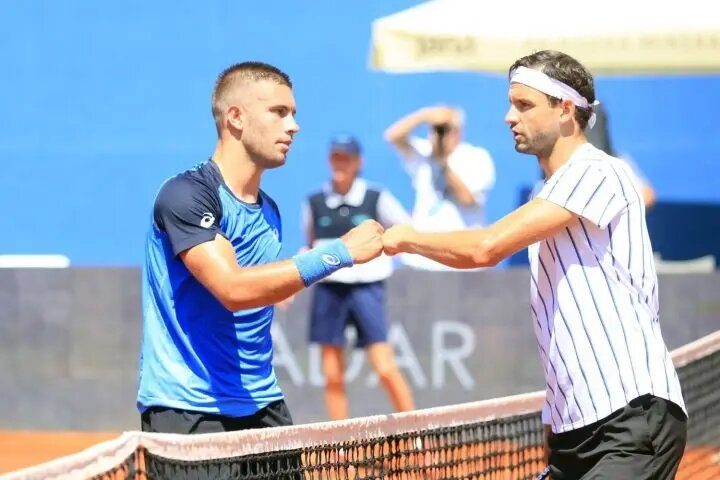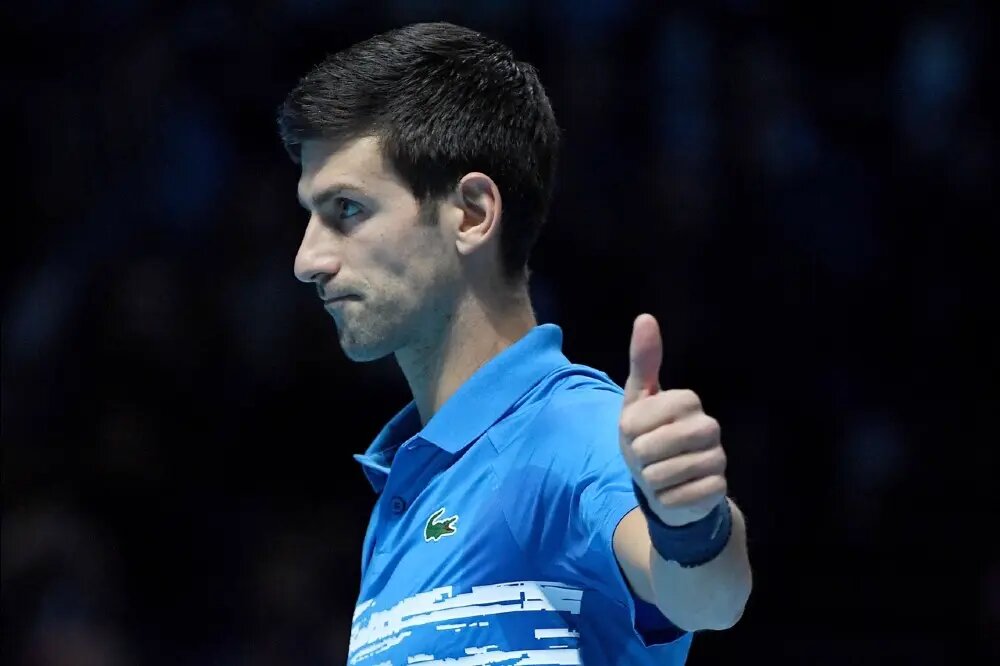By Alessandro Stella
The debate surrounding the cases of the coronavirus at the Adria Tour, which soon turned into a Djokovic berating platoon, is clearly the theme of the week in tennis. After the announcement of the positive test of Grigor Dimitrov, who was on the court in Zadar against Borna Coric on Saturday, the Croatian player also announced the ensuing morning that he had contracted the coronavirus. Next came Marco Panichi, Djokovic’s physio, and Kristijan Groh, Dimitrov’s coach, while according to some early rumours (confirmed by the Telegraph) Djokovic would have refused to submit to the swab in Croatia as asymptomatic to test himself directly on his return to Belgrade, together with his family members – he later tested positive, along with his wife Jelena, fellow countryman Viktor Troicki (his wife was also infected) and NBA star Nikola Jokic.
Why Djokovic is getting all the slander is easily explained: as the president of the ATP Player Council, he promoted the organising of the Adria Tour, an event slated to take place in four countries (the final two stops have now been cancelled) with his brother Djordje as the director, and whose opening fixtures, those of Belgrade and Zara, took place at full capacity and without any regard for social distancing, both on and off the court. In addition to post-match hugging, the players were also in close contact during the collateral activities of the event: a football game in Belgrade, a basketball game in Zadar, and even a night out at a local club. Even before he came under attack for promoting an exhibition without strict health protocols, the world No.1 had already been accused of having deserted at ATP Zoom meeting of June 10, in which the guidelines for the restarting of the season were discussed.
THE ADRIA TOUR DIDN’T BREAK ANY RULES
Let’s try to make order. The first question should pertain the legitimacy of the event, while the second should interrogate its propriety. Let’s start with the former: the Adria Tour was held in compliance with the Coronavirus protocols enforced in the countries that hosted the first two gigs, namely Serbia and Croatia. “It can be criticized,” Nole said during a press conference at the Belgrade event. “We can say, for example, that maybe it’s dangerous. But it is not for me to evaluate what is right from a public health standpoint: we are simply following the rules of the Serbian government.”
What Djokovic claims is true. On the website of the Organization for Economic Co-operation and Development, the policies adopted by the various countries to combat the COVID-19 pandemic can be consulted, and from the Serbian one we can learn that as of May 7 the containment measures – which for approximately a month had entailed a 12-hour curfew a month from 5pm to 5am – were relaxed. For the last month, it has no longer been necessary to provide evidence of negative testing upon entering the country, and starting from June 5 the restrictions on public participation in outdoor events have been removed, albeit with a metre of interpersonal distance still being “strongly recommended.”
To recap, there are no formal bans in Serbia, although the government still suggests – without obligation – to take some precautions. A choice, that of President Aleksandar Vučić – who has just been re-elected with a landslide majority, 62.4% of the votes – which according to some European media had the specific purpose of restoring a patina of serenity in the wake of the elections, initially scheduled for April 26 and then postponed by two months because of the virus.
As for Croatia, at the end of May the ban on organizing public events with more than 40 participants was lifted, and the feasibility of each event has since been referred to the evaluations of the Croatian Institute of Public Health, which evidently gave the go-ahead to the Adria Tour. Following the positive tests of Dimitrov and Coric, the head of the infectious diseases department Bernard Kaić spoke on television to calm the citizens of Zadar, explaining that “it is necessary to spend a lot of time with the infected person in order to become infected,” and that therefore those who were simply sitting in the stands are not at a high infection risk.

IS DJOKOVIC IN THE CLEAR THEN?
Theoretically, yes, even in the event that the legal responsibility of organizing the Adria Tour could be traced back to him. The question that cannot be overlooked, however, concerns the public role of Djokovic, and therefore the appropriateness of promoting an event that has completely disregarded social distancing (remember, strongly advised by the Serbian government) while the pandemic is still reaping victims in several parts of the planet.
In addition to being the strongest tennis player on the planet, which in itself would be enough to expect additional attention for actions and statements that may have direct consequences on the community, Djokovic is the first reference of tennis players by virtue of his role as the president of the Player Council. It is a political position in all respects, which implies political responsibilities (limited to the world of tennis, of course). Nobody forced him to take on this responsibility, which once assumed should be honoured in full.
Are we therefore assuming that Djokovic did not fully honour it in this case? Yes, to a certain extent. The Adria Tour could certainly be organized, but if the positivity of so many of the participants – there is no guarantee that they got infected by participating in the performance – had emerged on the side-lines of an event held with the suggested precautions, Djokovic would not have become the target he has become in the last few days.
One more aspect should be factored in. Djokovic rightly pointed out that it is not up to him to evaluate what is right vis-à-vis public health, but, precisely by virtue of the same principle, he doesn’t seem to have the prerogative to send such a free-for-all message like he did by planning the Adria Tour in this fashion. This does not imply that there were any bad intentions on the part of the Serbian player, just as there was no bad intentions in the words of the Italian politicians who, a few days before the outbreak of the epidemic in Lombardy, invited to everyone to go on with their lives as usual, and the same goes for British politics. Whether it is out of personal conviction, because he believes – rightly or wrongly – that the virus is no longer dangerous, or for a more Machiavellian purpose (perhaps to convince the US Open to relax its strict measures?), Djokovic has endorsed an initiative that could have had negative consequences on other people.
He was reckless, like the other players who were present, and it would be ethically incorrect not to point it out. It is one thing to be convinced that the virus never existed or is no longer dangerous, another thing is to translate this thought into actions of public interest.
To say that he was reckless doesn’t mean that he deliberately favoured the transmission of the virus, because there may also be no causal link between the Adria Tour and the early positive testing of Dimitrov and Coric, but rather that he chose to ignore the precautions who at this moment have the crucial task of guiding us at a time of collective uncertainty, of hypotheses and conflicting scientific opinions.
Djokovic does not know if the virus is still dangerous or not, as we do not know it or even those who have studied the subject for years (this should already be enough to induce in us a certain evaluative moderation, sadly forgotten). Djokovic may also be right, but it an unaware manner; he cannot be sure of the message he is sending. This is what precautions are for, however useless they may seem, and indeed the hope is exactly that one day they may be proved to have become useless – it will mean that everything has gone according to plan.
What is mistakenly interpreted as a devaluation of the scientific method and adduced as an argument in favour of the free-for-all thesis, namely that virologist A is convinced that asymptomatic cases are not dangerous for the transmission of the virus while virologist B argues otherwise, is actually the normal scientific debate that occasionally ends up in the public eye due to the planetary scope of the subject matter.
Science is actually stumbling in the dark, because that’s how it goes before the evidence makes everyone coalesce around a thesis, and we have a civic duty not to make things worse in this period of reckoning and stabilisation for researchers. If some virologists mess up in the haste of expressing themselves, if politicians and decision-makers overwhelmed by the crisis make shaky and incomprehensible choices, that doesn’t legitimise more than usual to do what we want to fight a supposed design that would enslave us to the drug companies (by the way, they are certainly not be the only corporate entities in the world that are trying to make up for missing revenues; many others have lost and will lose money because of the crisis, and are certainly not raising glasses of Dom Perignon, so the ice for this conspiracy theory feels paper-thin at best).
What the scientific community perhaps has not been able to communicate with sufficient clarity is the following concept: we do not know what we should know about the virus yet, nor do we have a valid strategy to cure and eradicate it, so in the meantime we ask you to sacrifice a few of your liberties so that enough time can be had to find a definitive countermeasure. Planning and hosting a tennis exhibition with some kind of social distancing in the stands and fewer on-court hugs, all in all, would have been a bearable sacrifice.






